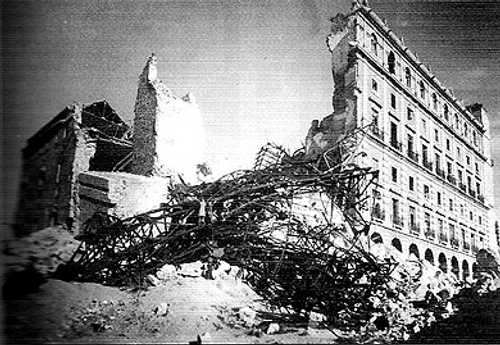
Other Forces
Alcazar de Toledo, "knocked about a bit" ...
Unknown (Spanish) author.
The Alcazar - palace-fortress - of Toledo after the siege of July - September, 1936, in which some 800 Spanish Nationalist defenders (mainly gendarmes of the Guardia Civil) held off some 8,000 - 1,000 Republican militiamen, mainly drawn from Socialist and Anarchist trade unions loyal to the Republican government. During the siege, the fortress and its out-buildings were progressively destroyed by Republican artillery and (in the case of the southern part) by mining. The Nationalists were eventually relieved by Franco's élite Army of Africa in late-September. The successful defence of the Alcazar was a great propaganda coup for the Nationalists, and for Franco in particular since his decision to relieve it sealed his position as predominant general among the Nationalist rebels. However, considering the matter rationally, it was surrounded by oddities on all sides. The Alcazar had been the seat of the Spanish kings (principally Carlos I - the Holy Roman Emperor Charles V) from the time of its recapture from the Moors until Carlos's son, Philip II, removed the seat of government to Madrid. However, in 1936, it was of little or no military or strategic value to anybody. As anybody who has visited Toledo will appreciate, the city - beautiful as it is - is lost in the middle of a sort of barren no-man's land south of Madrid; which, itself, was a city whose significance was more clearly political than strategic. The small garrison of gendarmes, officer cadets and civilians was effectively helpless; they could pose no threat to the Republican citizen's army massing at Madrid. The only rational basis for the Republicans' attack on Toledo was to secure control of the city's arms factory (a forlorn hope; after initial resistance, the small Nationalist garrison evacuated the facility, taking a huge quantity of ammunition with them, and blew the place up, just as might have been expected). Once that had occurred, there was little rationality to the continued Republican attacks on the structure that extended to a point, in September, at which the inexperienced militia army and its inexperienced commanders were at severe risk of being cut off and destroyed by the relieving Francoist Army of Africa. On the other side, several of Franco's colleague-generals were skeptical as to the desirability of relieving the Alcazar, and advocated a direct drive on Madrid which would in any event have forced the Republicans to lift the siege and fall back on Madrid. Franco, however, perceived the propaganda advantages of direct relief of the Alcazar and, since he enjoyed the fanatical loyalty of the Army of Africa, his opinion prevailed. In one way, he was correct; the Alcazar, its siege, and its relief became a core part of Nationalist propaganda and myth. On the other hand, one wonders whether a direct thrust at Madrid might have brought a (fairly) decisive battle, one way or the other, and shortened considerably a civil war that turned out to be lengthy, costly and brutal. Best regards, JR.
2272 Views
4/13/2015
